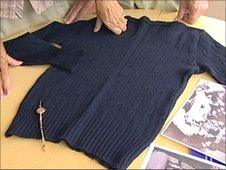Survivor of Lancastria sinking calls for remembrance
- Published
A Worcestershire woman who was the youngest survivor of Britain's worst maritime disaster has called for it to be remembered on its 70th anniversary.
Jacqueline Tanner, of Malvern, was aged two when the Lancastria was sunk by German bombs near the French port of St Nazaire in June 1940.
Around 7,000 British servicemen and civilians fleeing the Nazis were killed.
She has written to David Cameron asking him to recognise the disaster in 2010.
Mrs Tanner said: "No government has really acknowledged that it happened and they won't have acknowledged a war grave.
Clung to wreckage
"Why? I don't know, I've not had an answer."
Mrs Tanner was living with her parents in Belgium when they had to flee the German invasion of France and the Low Countries in 1940.
They eventually made their way to St Nazaire in France and boarded the Lancastria, a transatlantic liner taking part in the rescue of the remaining British personnel and civilians in France after the Dunkirk evacuation two weeks before.
It was packed with around 9,000 troops and civilians but as it sailed from the port on 17 June it was hit by three bombs from a German Junkers 88.
Mrs Tanner said: "The ship immediately started to turn and, as my parents tried to get out, my mother called out `Baby here, baby here,' and I took up the cry too.

A sailor's jumper given to Mrs Tanner on the Lancastria
"They said the crowd parted and let us go straight up to the deck. They put mother and me in a lifeboat and dad said he would stay with the men, but they made him get in too."
Unfortunately, the lifeboat soon sank and there was no alternative but to swim.
"It was a beautiful summer and a very calm sea," Mrs Tanner said.
"Oil was spreading over the water and the Germans were machine gunning the sea to set fire to the oil."
The family clung to wreckage until they were picked up by the Highlander, whose deck was strewn with bodies.
Prime Minister Winston Churchill ordered news of the sinking to be suppressed for fear of morale being undermined at a time when the war was going badly for Britain.
In 2007 the Scottish government issued a commemorative medal - about 400 Scots died in the disaster - but no British government has formally recognised the diaster.